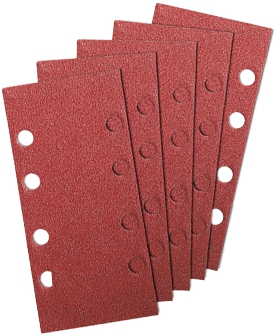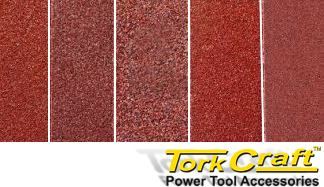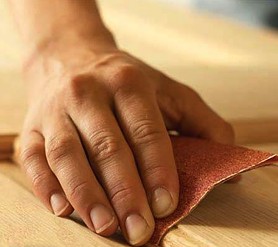



- Item No: ABR46150
- Weight: 0.07kg
- Dimensions: 260.00mm x 97.00mm x 10.00mm
- SKU: ABR46150
- UPC: 6009515807184
Available Options

For third-sheet orbital sanders that have a hook and loop backing pad.
SIZE: 115 x 280mm
GRIT: P150
HOLES: Yes
BACKING: Hook and loop
Application:
The orbital sander sheets have been precut to fit most third sheet orbital
sanders.
The abrasives are made of aluminium oxide and can be used on either wood or metals.
Orbital sanders cause swirl marks. A stray piece of grit or a larger bit of dust could be embedded on the abrasive sheet whilst sanding. Try to move the sander slowly when sanding. Any fast movements can cause noticeable swirl marks.
What is grit?
 When talking about sandpaper 'grit' is a reference to the number
of abrasive particles per inch of sandpaper. The lower the grit the rougher the
sandpaper and conversely, the higher the grit number the smoother the sandpaper.
When talking about sandpaper 'grit' is a reference to the number
of abrasive particles per inch of sandpaper. The lower the grit the rougher the
sandpaper and conversely, the higher the grit number the smoother the sandpaper.

This make sense if you imagine how small the particles on an 1000-grit sandpaper would need to be to fit into a 1' square (25,4mm square). Sandpaper is referred to by the size of its grit (Example 120-grit sandpaper or P120 sandpaper).
 Choice
Choice
You need to choose the grit size of sandpaper depending on the particular job you are trying to accomplish. For heavy sanding and stripping, you need coarse sandpaper measuring 40- to 60-grit; for smoothing surfaces and removing small imperfections, choose 80- to 120-grit sandpaper. For finishing surfaces smoothly, use a super fine sandpaper with 360- to 600-grit. Many jobs require you to “go through the grits.” This means you start the project using lower-grade grit and use finer pieces of sandpaper as you progress. Each time you advance to a higher grit sandpaper, you remove the scratches from the previous layer.








































